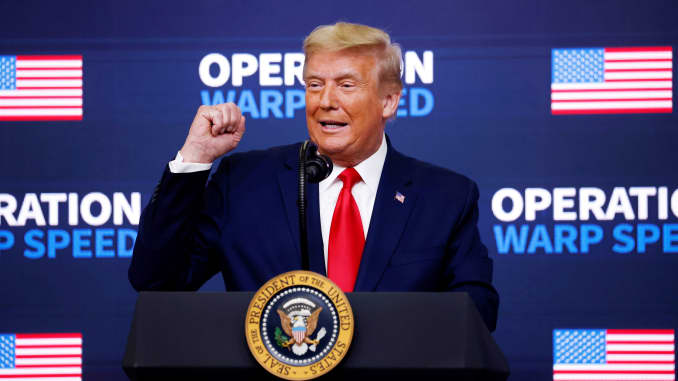 English
English

Contradicting his secretary of state and other top officials, President Donald Trump on Saturday suggested without evidence that China not Russia may be behind the cyberattack against the United States and tried to minimize its impact.

Washington: Contradicting his secretary of state and other top officials, President Donald Trump on Saturday suggested without evidence that China not Russia may be behind the cyberattack against the United States and tried to minimize its impact.
In his first comments on the breach, Trump scoffed at the focus on the Kremlin and downplayed the intrusions, which the nation's cybersecurity agency has warned posed a "grave" risk to government and private networks.
"The Cyber Hack is far greater in the Fake News Media than in actuality. I have been fully briefed and everything is well under control," Trump tweeted. He also claimed the media are "petrified" of "discussing the possibility that it may be China (it may!)." There is no evidence to suggest that is the case.
Secretary of State Mike Pompeo said late Friday that Russia was "pretty clearly" behind the cyberattack against the United States.
"This was a very significant effort and I think it's the case that now we can say pretty clearly that it was the Russians that engaged in this activity," Pompeo said in the interview with radio talk show host Mark Levin.
Officials at the White House had been prepared to put out a statement Friday afternoon that accused Russia of being "the main actor" in the hack, but were told at the last minute to stand down, according to one US official familiar with the conversations who spoke on condition of anonymity to discuss private deliberations.
It is not clear whether Pompeo got that message before his interview, but officials are now scrambling to figure out how to square the disparate accounts. The White House did not immediately respond to questions about the statement or the basis of Trump's claims. The State Department also did not respond to questions about Pompeo's remarks.
Throughout his presidency, Trump has refused to blame Russia for well-documented hostilities, including its interference in the 2016 election to help him get elected. He blamed his predecessor, Barack Obama, for Russia's annexation of Crimea, has endorsed allowing Russia to return to the G-7 group of nations and has never taken the country to task for allegedly putting bounties on US soldiers in Afghanistan.
Pompeo in the interview said the government was still "unpacking" the cyberattack and some of it would likely remain classified.
"But suffice it to say there was a significant effort to use a piece of third-party software to essentially embed code inside of US government systems and it now appears systems of private companies and companies and governments across the world as well," he said.
Though Pompeo was the first Trump administration official to publicly blame Russia for the attacks, cybersecurity experts and other US officials have been clear over the past week that the operation appears to be the work of Russia. There has been no credible suggestion that any other country including China is responsible.
Democrats in Congress who have received classified briefings have also affirmed publicly that Russia, which in 2014 hacked the State Department and interfered through hacking in the 2016 presidential election, was behind it.It's not clear exactly what the hackers were seeking, but experts say it could include nuclear secrets, blueprints for advanced weaponry, COVID-19 vaccine-related research and information for dossiers on government and industry leaders.
Russia has said it had "nothing to do" with the hacking.
While Trump downplayed the impact of the hacks, the Cybersecurity and Infrastructure Security Agency has said it compromised federal agencies as well as "critical infrastructure." Homeland Security, the agency's parent department, defines such infrastructure as any "vital" assets to the US or its economy, a broad category that could include power plants and financial institutions.(PTI)
No related posts found.